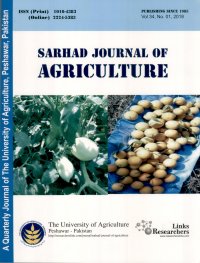Impact of Organic Soil Amendments Using Nerium oleander Powder on Bacterial Wilt Severity in Tomato
Impact of Organic Soil Amendments Using Nerium oleander Powder on Bacterial Wilt Severity in Tomato
Aamir Sohail1, Irshad Ali Khan2*, Ahmed Shamkhi Jabbar3, Mehran Gul2, Sidra Ahmad4, Nayab Ahmad4, Farzana6, Abdur Rehman5, Arooba Bashir4, Syed Muhammad Owais Shah2 and Ayesha Alam7
ABSTRACT
This study evaluated the efficacy of dried Nerium oleander powder in controlling bacterial wilt (BW) in tomatoes. The experiment applied the powder to pathogen-contaminated soil using mulching and mixing techniques, testing two particle sizes (fine and coarse) at four doses (0 g, 14 g, 28 g, and 42 g). Laboratory results showed that all powder concentrations significantly inhibited pathogen growth compared to the control, with the 15% powder extract achieving the highest inhibition zone (16.25 mm), followed by the 10% extract (12.47 mm). The implementation of this approach resulted in significant enhancements in the length of tomato plant roots (98.54%), shoot length (23.11%), and fresh biomass (18.97%) as compared to the control group that did not get any treatment. In addition, the smaller particle size at the higher dosage (42 g/kg soil) functioned better than the larger particle size, leading to increases of 50%, 33.04%, and 31.26% in root length, shoot length, and fresh biomass, respectively. The finely ground powder’s effective integration with soil facilitated the rapid breakdown of organic matter, thereby enhancing the release of volatile and non-volatile compounds with bactericidal properties. Consequently, this process effectively suppressed pathogen populations in the soil, contributing to the control of bacterial wilt. Based on these findings, adding 42 g of dried N. oleander powder per kilogram of soil has the potential to effectively suppress bacterial wilt in tomatoes and potentially other vegetables. These findings suggest that dried Nerium oleander powder, particularly at a dosage of 42 g/kg soil, holds promise as an effective organic solution for controlling bacterial wilt in tomatoes.
To share on other social networks, click on any share button. What are these?








